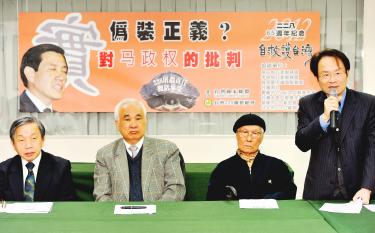DHARAMSHALA, February 19: Amidst the ongoing self-immolations, another teenaged Tibetan in Tibet set himself on fire and is reportedly dead.
The 18 year old teenaged Tibetan, Nangdrol set himself on fire today in the afternoon in Amdo Ngaba, the nerve centre of almost all the Tibetan self-immolations in the recent months.
Taiwan 228 Care Association Secretary-General Chang Yen-hsian, left, Taiwan National Alliance Convener Yao Chia-wen, second left, and former 228 Justice Association, Taipei secretary-general Ouyang Wen, second right, listen as 228 Justice Association, Taipei Secretary-General Chen Yi-shen explain a series of events to take place on Feb. 28 at a press conference in Taipei yesterday.
Photo: Chien Rung-fong, Taipei Times












